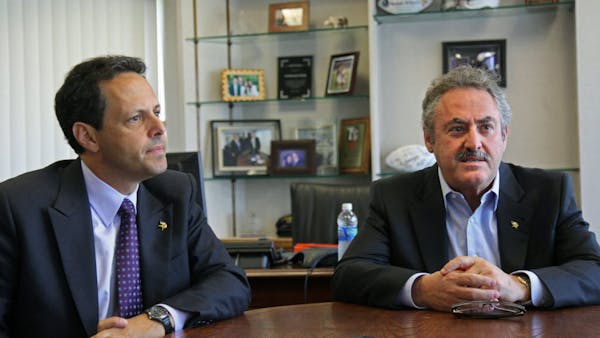With groundbreaking on a new Minnesota Vikings stadium only weeks away, final approval of key development agreements has been put on hold to allow the state to conduct a more extensive background investigation into the team's owners.
The Minnesota Sports Facilities Authority, the public body overseeing the nearly $1 billion project, said Tuesday that it has retained Peter Carter of the Dorsey & Whitney law firm to lead a "due diligence" review of Vikings owner Zygi Wilf and his family's real estate business. Carter has tried cases involving racketeering and performed similar investigations for some of the nation's largest firms.
The review group, which will also include FTI Consulting, an international forensic accounting firm, will scrutinize Wilf family litigation in New Jersey and perform "extensive background checks" as well as review the NFL's investigations of owner applications, the authority said in a written statement.
The deeper background check stems from a finding last week by a New Jersey Superior Court judge in a long-pending lawsuit against Wilf and the family's real estate business. The judge said the family was guilty of fraud, breach of contract and violations of the state's civil racketeering statute in connection with a real estate partnership.
Gov. Mark Dayton, lead promoter of the stadium which has the state of Minnesota and the city of Minneapolis set to pay $498 million of the $975 million price tag, later said that he found the judge's comments "very, very concerning" and urged the authority and its legal counsel to carefully review the owners and team commitments to the project to ensure that they are "truthful and accurate."
"We're just double-checking everything at this point," Michele Kelm-Helgen, the authority's chairwoman, said Tuesday.
A Dayton spokesman said Tuesday the governor believes the authority's plan is in line with what he was seeking.
The due diligence comes as the team and stadium authority near final negotiations on stadium lease and development agreements. The two sides had hoped to sign off on both at the authority's Aug. 23 meeting, but Kelm-Helgen said final action will likely be at a special meeting at a later date.
She said the turnaround time for the review will take "weeks, not months," and should not delay plans for an October groundbreaking on the stadium. The team hopes to open the stadium in time for the 2016 NFL season.
Lester Bagley, the Vikings vice president of public affairs, said the team "will cooperate fully" with the authority's probe. But he expressed concern about the project's tight timeline, and said he hoped the authority would continue to work on design and construction issues while the review work takes place.
The Vikings and the Wilfs both said last week that the outcome of the lawsuit will have no bearing on the family's ownership of the team nor jeopardize stadium financing.
The Vikings are responsible for $477 million of construction costs through a $200 million NFL loan and revenues generated from stadium naming rights, sponsorships and seat licensing fees.
An NFL spokesman reiterated Tuesday that the outcome of the Wilfs' civil case will not affect the team's standing or the league's commitment to the stadium project.
New Jersey Superior Court Judge Deanne Wilson is expected in coming weeks to announce her decision on compensatory and punitive damage sums that the Wilfs would have to pay to resolve the long-running real estate case.
The judge's conclusions could also include a request that the Wilfs release information about the family's financial net worth, documentation that could be extremely important for stadium officials in Minnesota, who hope to sign off on the final development agreements before the state sells taxpayer-backed bonds to pay its share of construction costs.
The Wilfs have large business holdings in the New Jersey area, but the family has long kept private its dealings. A 2011 Sports Illustrated study listed Zygi Wilf's net worth at $310 million, placing him 27th among the NFL's 32 owners.
The civil case at issue surfaced two decades ago when the Wilfs were sued by two business partners under New Jersey's RICO statute for allegedly cheating them out of more than $20 million over ownership of a 764-unit apartment project called Rachel Gardens, in Montville, N.J.
Staff writers Jim Ragsdale and Mike Kaszuba contributed to this report. Richard Meryhew • 612-673-4425

Driver pulled from burning car on I-94 in St. Paul thanks good Samaritans for saving his life

73 years later, St. Peter man finally receiving his Purple Heart
Life sentence for man who fatally beat girlfriend while her children were nearby in her Medina home

